The best keyword research tools are paramount to success in the wild SEO world. Keywords play a major role in your ranking. Their optimization helps you appear higher in Google search results, beating your rivals as a result. However, manual labor isn’t an option.
You can play a guessing game and try to find keywords on your own. This, as expected, won’t be great, as SEO trends are evolving and changing daily. For this reason – and ample more – you need some of the most capable keyword research software.
This software will analyze competitor keywords for you, produce new keyword ideas, and give you insights about each analyzed keyword. Think of it as an all-encompassing suite that skyrockets your keyword game and directly boosts your SEO ranking; now we’re talking.
Best Keyword Research Software: A Shortlist for 2024
- Semrush – the overall #1 keyword research tool
- SE Ranking – cost-effective SEO keyword research solution
- Ahrefs Keyword Explorer – lots of KW information with pinpoint accuracy
- Google Search Console – first-hand keyword-related data
- Moz Keyword Explorer – great for finding new keyword optimization ideas
- Jaaxy – free keyphrase suggestions obtainable in seconds
- KeywordTool.io – a keyword tool that supports 10+ search engines
- QuestionDB – detects related questions
- KWFinder by Mangools – intuitive and budget-friendly tool
- SECockpit – in-depth keyword analyses and reports
Best Keyword Research Tools of 2024: Ranked By Experts
The market houses, and is saturated, with so many keyword research tools, yet, very few are great.
Our team has spent hours using, analyzing, and testing most of them to bring you this list. We included PAID and FREE options that you can test without spending a penny. Finally, the list contains 10 amazing SEO keyword research tools in total, which should be plenty to work with.
1. Semrush
Let’s start with our favorite for 2024 – Semrush. This is an all-around tool for keyword research, domain analysis, content marketing, rank-tracking, and much more! However, if you want to improve your keyword game, its Keyword Magic Tool will serve you more than exquisitely.
It revolves around entering the seed key phrase and getting tons of excellent suggestions. Depending on the keyword you provide, you can get thousands of different suggestions, each with information like difficulty, CPC, search volume, and other tidbits.
© Semrush
Adding to Semrush’s versatility, you can even apply the language filter. You don’t have to focus on your SEO in English, so even foreign users can enjoy it. We love other filters of the Magic Tool. For instance, you can set the number of words in the advised keywords.
Get New Keyword Opportunities With Semrush
If you set it to 3-6, you can discover long-tail keywords that improve your SEO ranking for more specific terms. This isn’t all. Semrush offers the Keyword Overview tool that analyzes each keyword separately and tells you if it’s worth “doing” based on the difficulty score.
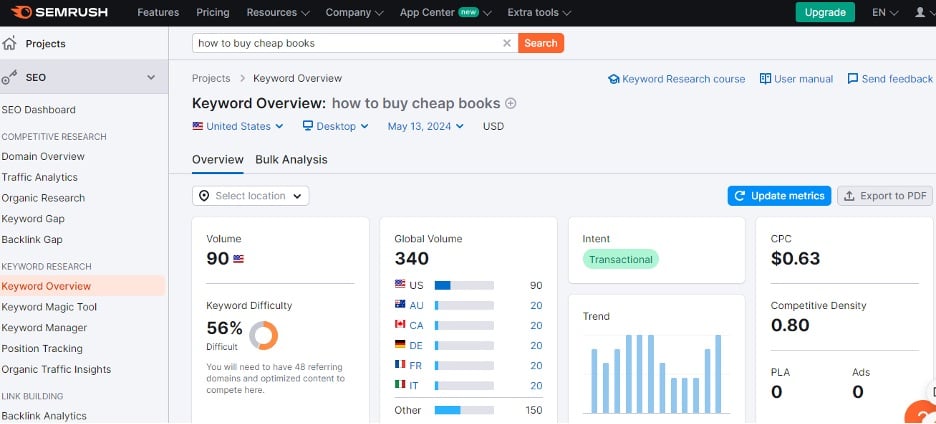 © Gizmodo.com
© Gizmodo.com
Moreover, there’s the Keyword Gap tool, which we use daily. It displays the phrases your competitors rank for but not you, letting you “close” the gap by chasing these ranks. Better yet, you can compare your site to up to four other competitors for more insights.
We don’t think you should use Semrush only as the #1 keyword research tool. It’s amazing for page crawling and site audits to fix potential problems. Also, we’d like to praise its rank-tracking functions with daily updates that will keep you posted on every little change.
How much does Semrush cost?
Good news – Semrush can also be a FREE keyword research tool.
In the free plan, you’re limited in the number of terms you can research. Its paid plans are on the pricier side but not with a 14-day free trial and a 17% discount that helps you save money on its Pro, Guru, and Business plans.
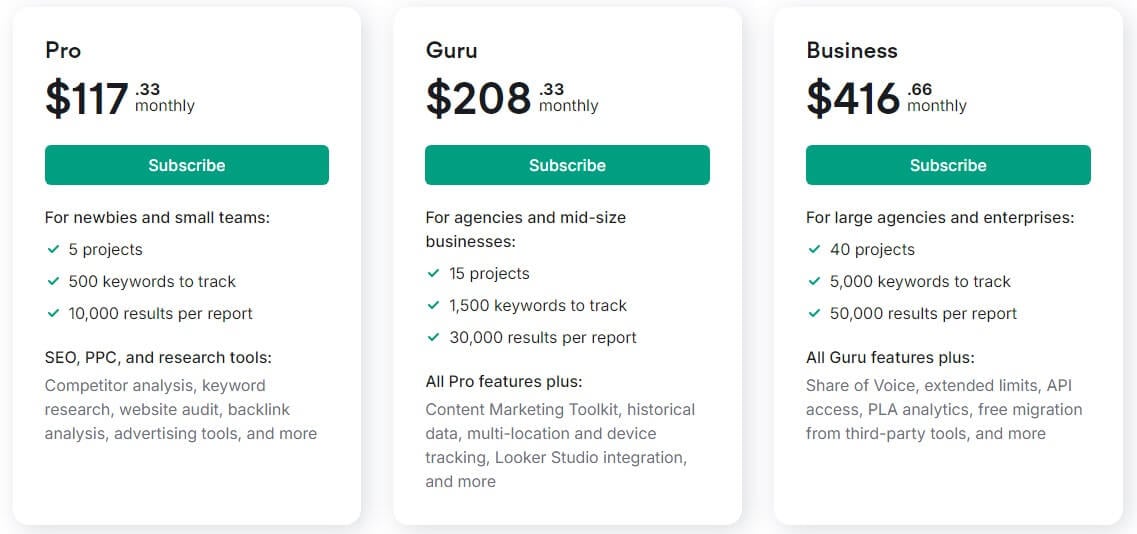 © Semrush
© Semrush
For basic keyword research, the Pro plan will do fine, as it can track 500 keywords and provide 10,000 results per report at $117.33 monthly. The Guru plan triples both numbers at $208.33 and is our recommended pick. See our Pro vs Guru Semrush comparison for more info.
Get Semrush: The #1 Keyword Research Tool
2. SE Ranking
SE Ranking is our second-best keyword research tool, but it is still inferior to Semrush. However, this doesn’t mean you won’t enjoy it. Its Keyword Research tool will provide you with ample information about the keyphrase, such as the difficulty, volume, global volume, and CPC.
The same page houses information about keyword ideas and ranking dynamics, showcasing the keyword’s performance over time. We love that you can click on the suggestions and get things like related questions/keywords and similar keywords with difficulty and volume.
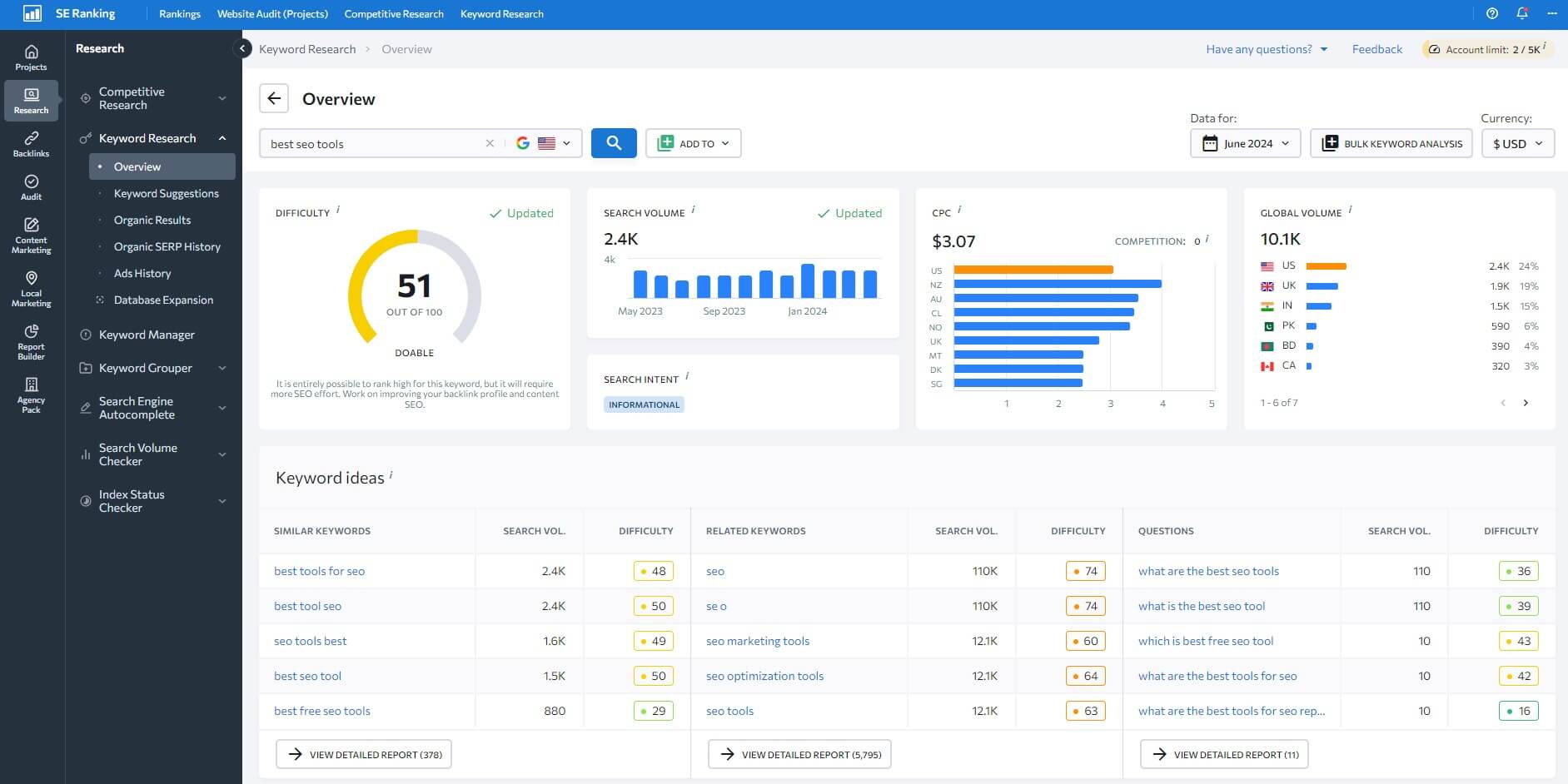 © SE Ranking
© SE Ranking
A handy addition is the Keyword Manager, letting you craft keyword lists and track each keyword’s ranking. Speaking of lists, there’s the Keyword Grouper that you can use to create clusters of keyphrases based on their SERP similarity and monitor their rankings.
Perform Keyword Research With SE Ranking
Be aware that the Keyword Magic Tool from above isn’t here. It’s Semrush’s proprietary tool. Still, comparing SE Ranking to Semrush in this regard won’t be detrimental to the former. SE Ranking has content marketing, contributing to your overall SEO and ranking.
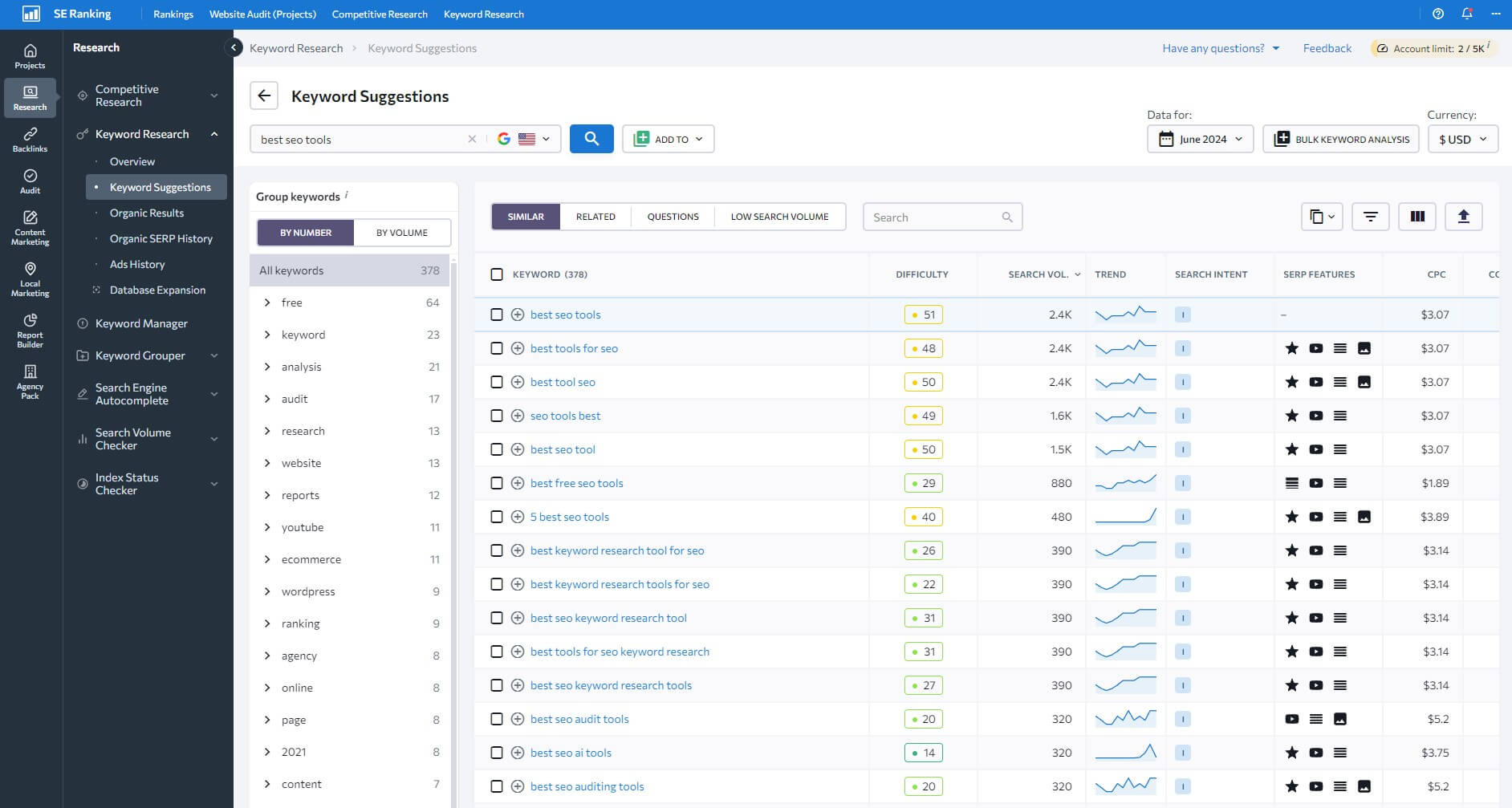 © SE Ranking
© SE Ranking
It can analyze your content and be a great keyword research tool, as it advises which phrases to insert to better optimize your page. Of course, site audits, position tracking, and an AI writer are all here, ensuring you get a lot more than keyword and domain analysis.
How much does SE Ranking cost?
The main advantage of SE Ranking is its VERY low price.
The Essential plan is already great for this purpose, offering pretty much all the important features of this provider. At $52/mo, you’ll pay roughly 50% less than Semrush. The Pro plan is our favorite pick.
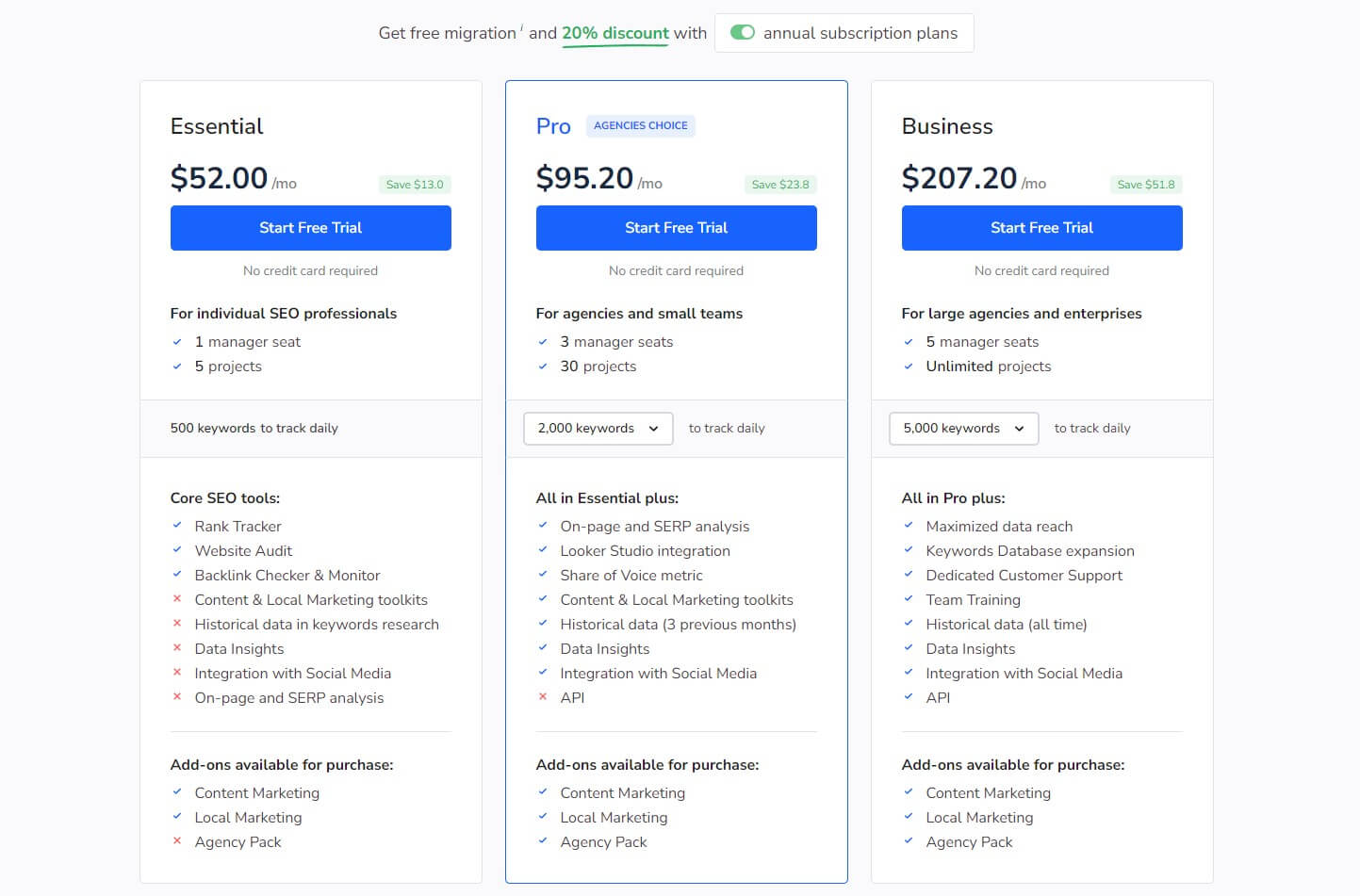 © SE Ranking
© SE Ranking
At $95.20 a month, you get 3 user seats, 30 projects, historical data, and a whopping 5,000 keyword/domain analysis reports per DAY. SE Ranking has a full-fledged 14-day trial without a credit card, so hop on the bandwagon and give it a shot. Sadly, there’s no forever-free plan.
Save 20% On All SE Ranking Plans
3. Ahrefs Keyword Explorer
Ahrefs is a champ in information delivery, much like Semrush. While Ahrefs is inferior – at least for us – its Keyword Explorer tool is extremely intuitive and feature-packed. You’ll need to provide a seed phrase, after which, you’ll be greeted by the keyword difficulty metric.
This is one of our favorite metrics, as it shows you how hard it’ll be to rank for it. Furthermore, Ahrefs is incredibly accurate here, showing you how many backlinks you’ll need to rank in the top 10 for the keyword. We haven’t seen this feature in SE Ranking, let’s say.
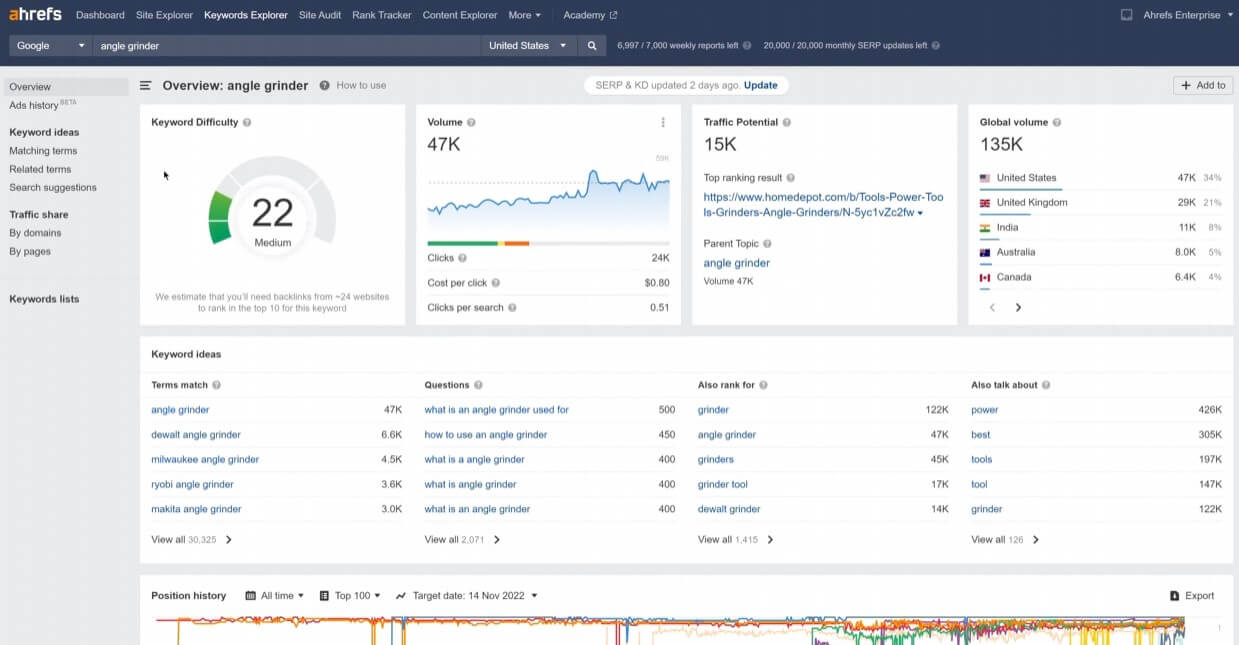 © Ahrefs
© Ahrefs
Instead of being “vague”, Ahrefs will precisely point you in the right direction. Of course, obtaining insightful keyword ideas is possible. You’ll see matching terms, questions, and the “also rank for” section, allowing you to see more varieties of the same keyword.
Ahrefs also displays metrics like volume, CPS, and CPC, with the traffic potential which is an estimation of how much traffic the page that ranks for the given phrase will generate. Like Semrush, Ahrefs contains many more amazing SEO tools that extend far beyond this one.
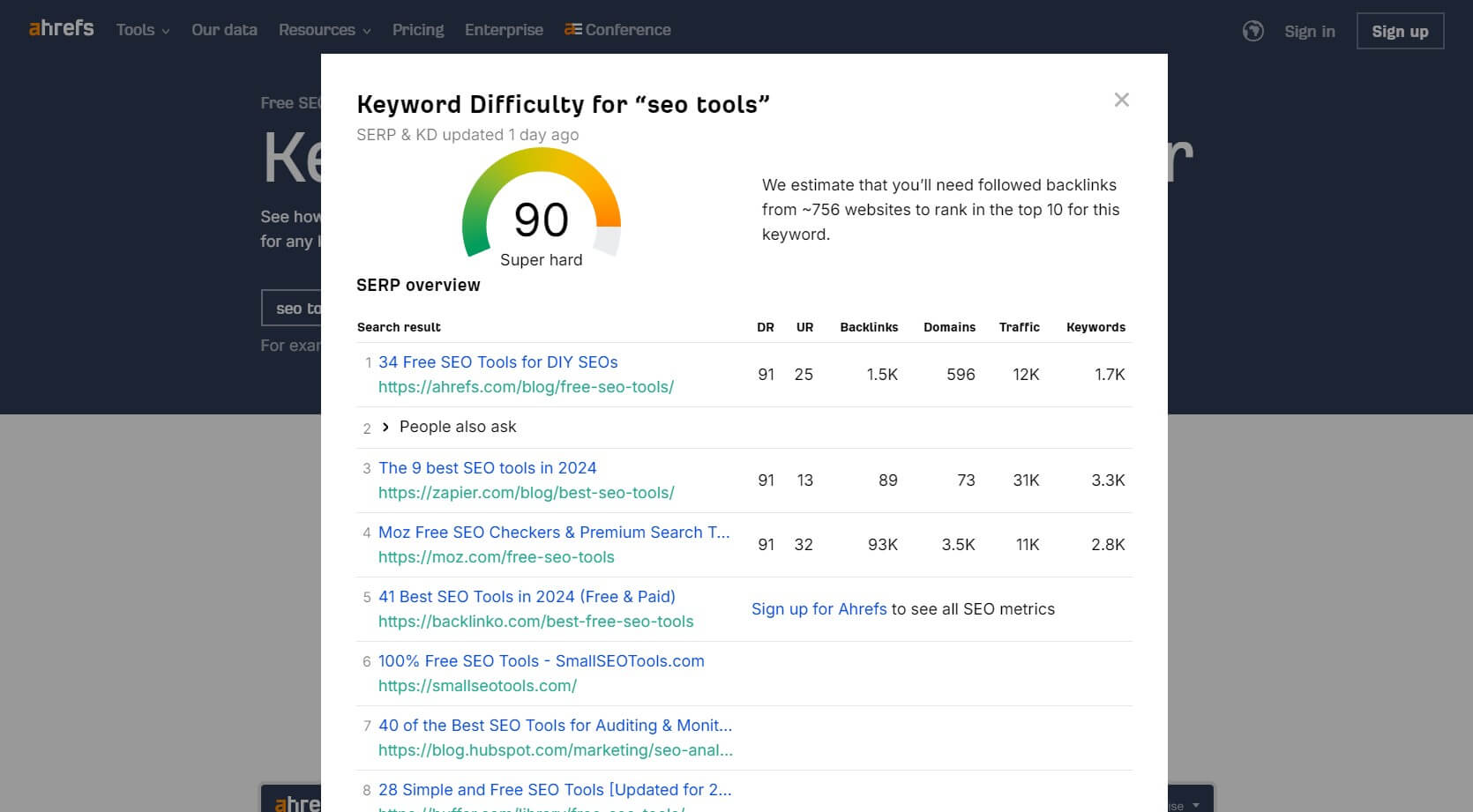 © Ahrefs
© Ahrefs
In particular, its Site Explorer tool is one of the best options for exploring competitors’ backlinks. Then, there’s the Rank Tracker which offers valuable information about your keyword performance, alas, with weekly ranking updates, which is disappointing.
How much does Ahrefs cost?
Instead of its Keyword Explorer, you can opt for the Keyword Generator tool that’s FREE and lets you generate keyword ideas and related questions. If not, you’ll need to pay for the former, and the cheapest you can get Ahrefs is $107 a month for the annual plan.
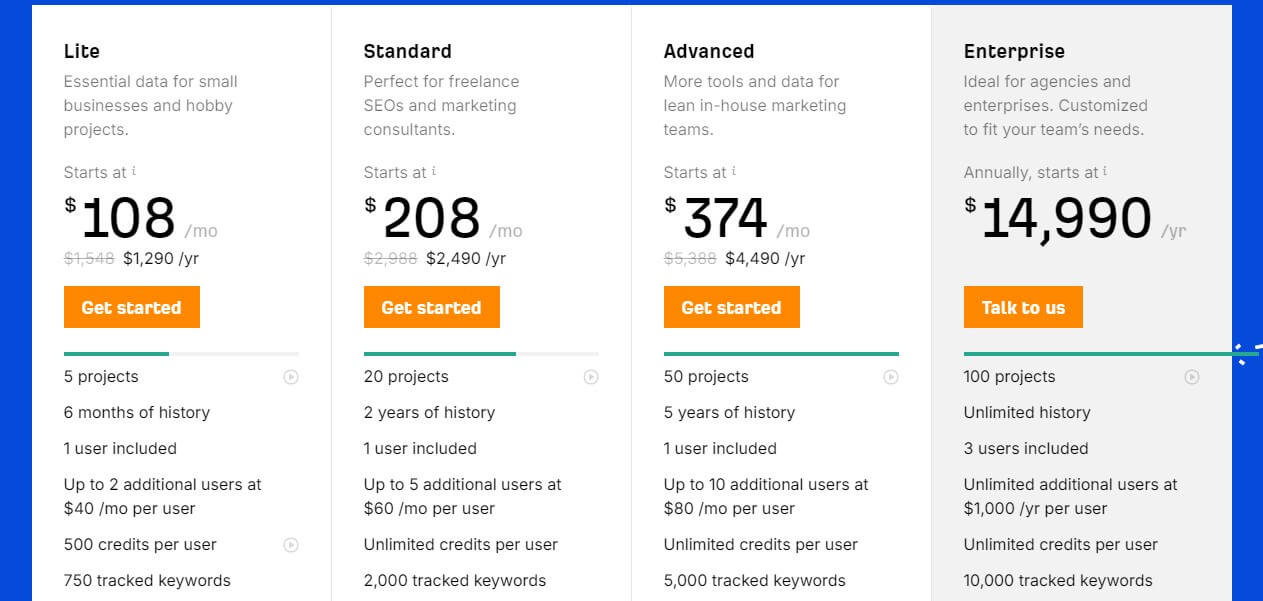 © Ahrefs
© Ahrefs
We usually don’t recommend Ahrefs because it’s pricey compared to many of its rivals. Its “Credits” system takes away from the experience, which is many users’ complaints. However, we can’t dispute its importance as one of the top keyword research tools in 2024.
4. Google Search Console
They say you shouldn’t ask the fish for advice on catching fish. We disagree this time. Google Search Console is great for first-hand information about your website performance, as you’re likely trying to rank higher on this search engine.
What about keyword research tools?
There’s a tool called The Performance Report. Clicking on it brings up the pages with the most clicks but there’s something more important; the keyphrases that “produced” these clicks. For example, you type in “the best SEO tools” and you arrive here at Gizmodo.
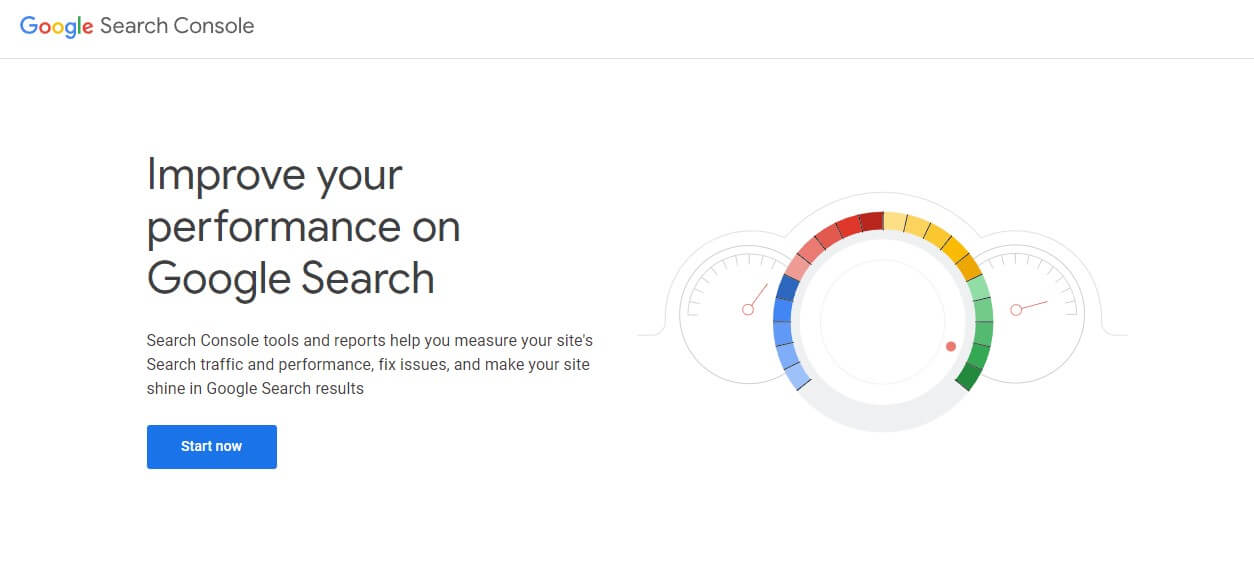 © Google
© Google
With this knowledge, you can use Google Search Console to discover opportunity keywords to boost the ranking of specific pages. These keywords display your ranking between #8 and #20 for the given phrase, and if you land in this range, this is your opportunity keyword.
You can use this keyphrase as a reference, to optimize the page around it and boost its ranking a bit. We should also mention other Google products, where its Keyword Planner takes the crown. It’s very simple to use and displays various suggestions and ideas.
The Keyword Planner is very simple to use and is quite limited compared to Semrush or SE Ranking. The good news is that it’s FREE, along with Google Search Console and other SEO tools from this company. Just don’t expect any advanced features and you’ll be happy.
5. Moz Keyword Explorer
Moz Keyword Explorer won’t move rocks with its might. It’s pretty “standard” but great if you want both free and paid keyword research tools. If you use its free version, you can perform 3 searches daily, apply the location filter, and get bespoke keyword-related information.
This includes search volume, CTR, difficulty, and top-tier suggestions, albeit, without questions. Paying for Moz Pro will unlock the full capabilities of this tool and let you perform more searches, with at least 5,000 rows per query, resulting in more suggestions.
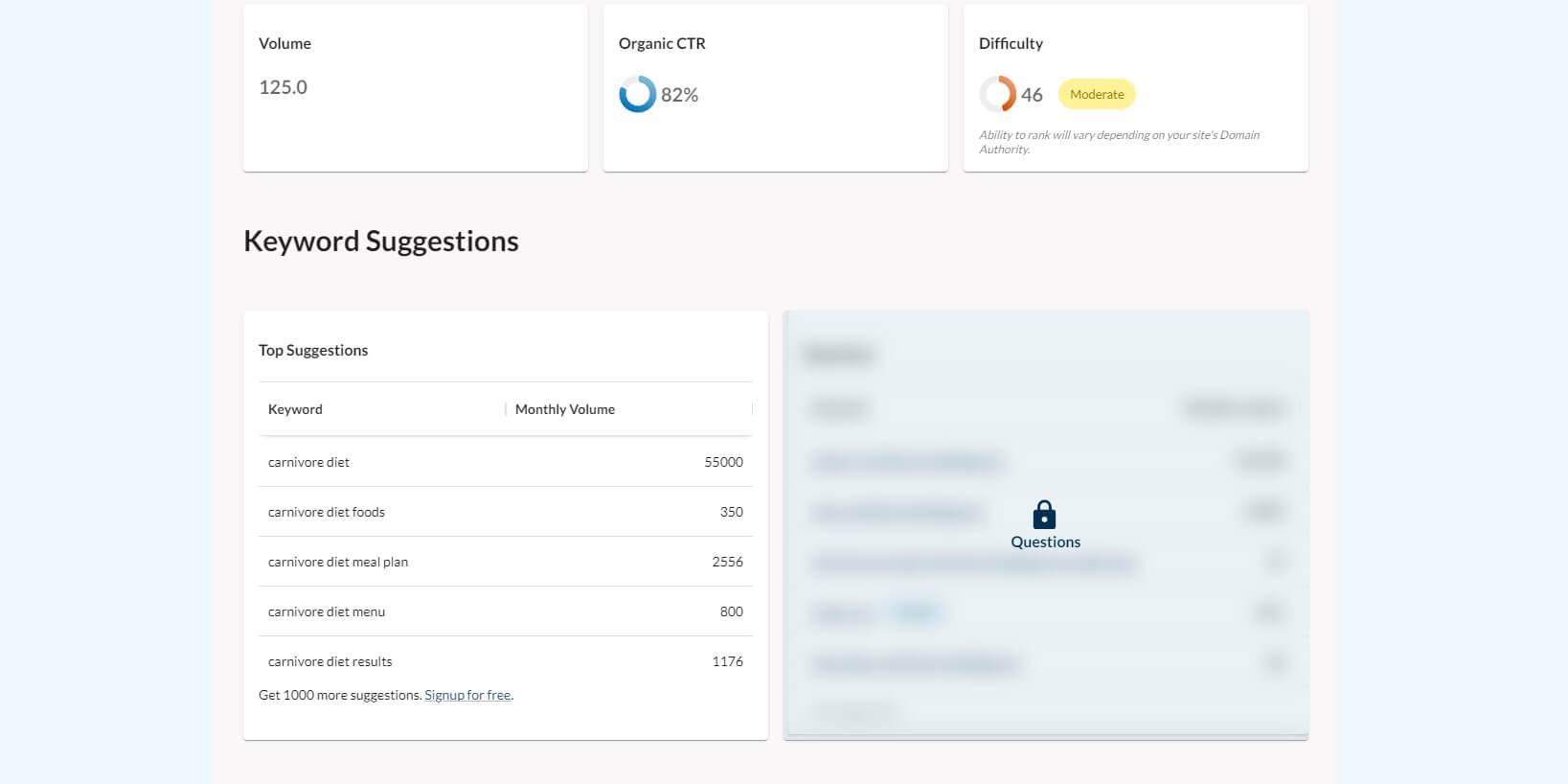 © Moz
© Moz
Moz Keyword Explorer is very simple to use and is a great alternative to Ahrefs if you don’t want to pay that much. On top of that, Moz Pro – if you pay for it – offers tools like competitive research, site audits, on-demand crawls, and even re-crawls.
Paid plans also include backlink analysis, which is essential in the ever-lasting battle with your competitors. Sadly, we don’t like Moz’s absence of content marketing, which should be there at least in more expensive plans. Even Ahrefs now offers something akin to it.
How much does Moz Keyword Explorer cost?
As said, it’s free and paid – depending on your choice. Paying for it requires a Starter plan at $39 a month annually. The best-value plan is the Medium one at $143 monthly, which allows for 2 user seats, 1,500 trackable keywords, and 2,000,000 monthly crawled pages.
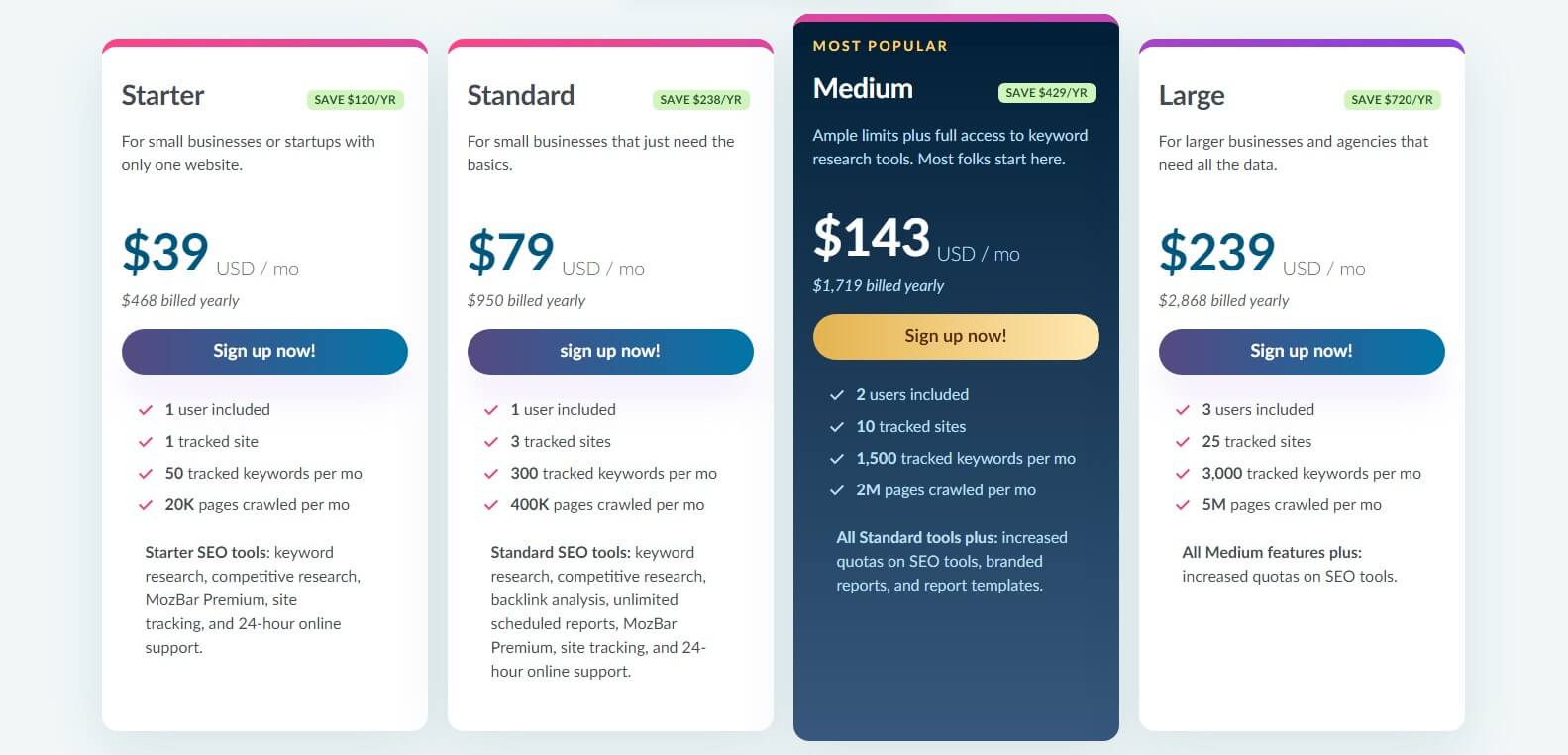 © Moz
© Moz
A huge advantage is its 30-day free trial that lets you test all of its features and see if you like them. Moz Keyword Explorer is one of them and isn’t limited to 3 daily queries. Feel free to explore Moz and sift through all of its SEO tools – you have nothing to lose.
6. Jaaxy
Jaaxy excels in simplicity and refuses to waste your time by making the keyword research process dead simple. Once you sign up for it, click on “Keywords”, provide the phrase, and press the blue “Find Keywords” button. You’ll see suggestions below in seconds.
Jaaxy provides TONS of interesting ideas with information regarding traffic, average search volume, and a great parameter titled QSR. QSR stands for Quoted Search Result, which displays the number of websites trying to rank for the term, which we found handy.
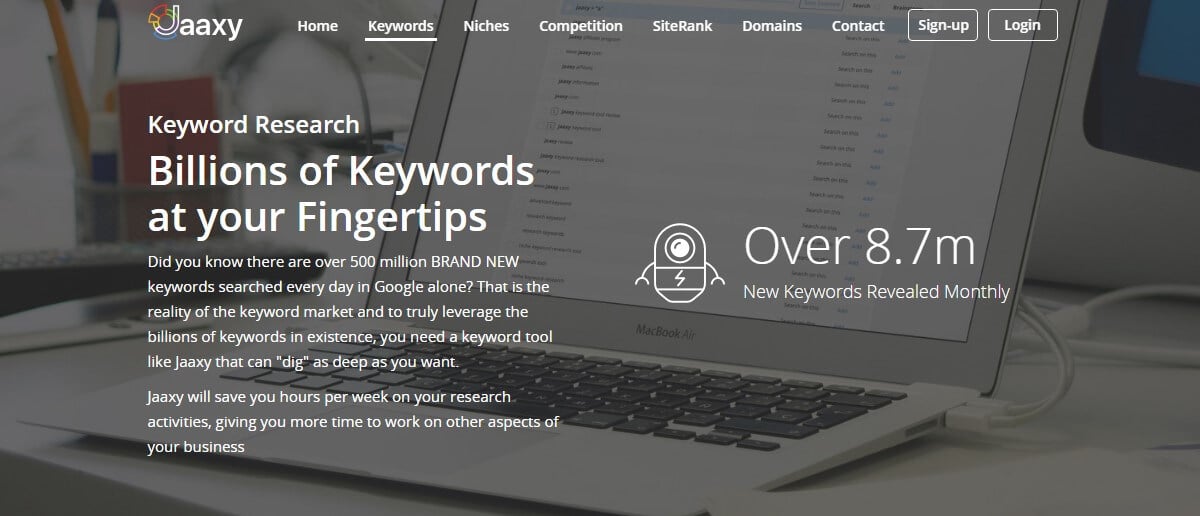 © Jaaxy
© Jaaxy
Think of it as your “difficulty” metric because the lower the QSR is, the easier it’ll be to rank for the phrase. Jaaxy has expanded its capabilities now, offering additional tools like Website Analyzer, competitive research, and rank-tracking capabilities – quite a toolkit.
However, Jaaxy is far from being very advanced and surely won’t beat Semrush or Ahrefs in more comprehensive analyses that SEO experts long for.
How much does Jaaxy cost?
You have a great Starter plan for testing purposes, where you can perform 30 keyword searches and get only 20 search results. This is a free trial option, so if you want to enjoy it long-term, consider at least the Pro plan at $49 a month or the Enterprise plan at $99 a month.
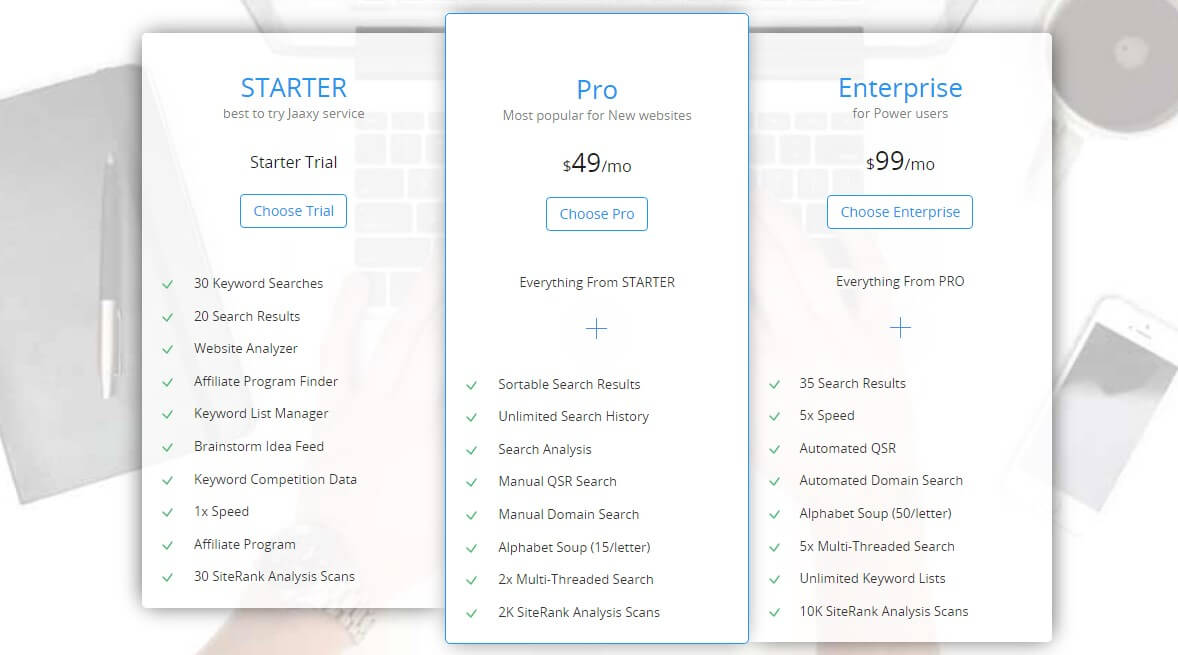 © Jaaxy
© Jaaxy
7. KeywordTool.io
Keywordtool.io looks a bit dated but is an excellent free keyword research tool for quick information. This one relies on Google Search Autocomplete to display ubiquitous suggestions joined by data about competition, average CPC, trends, and search volume.
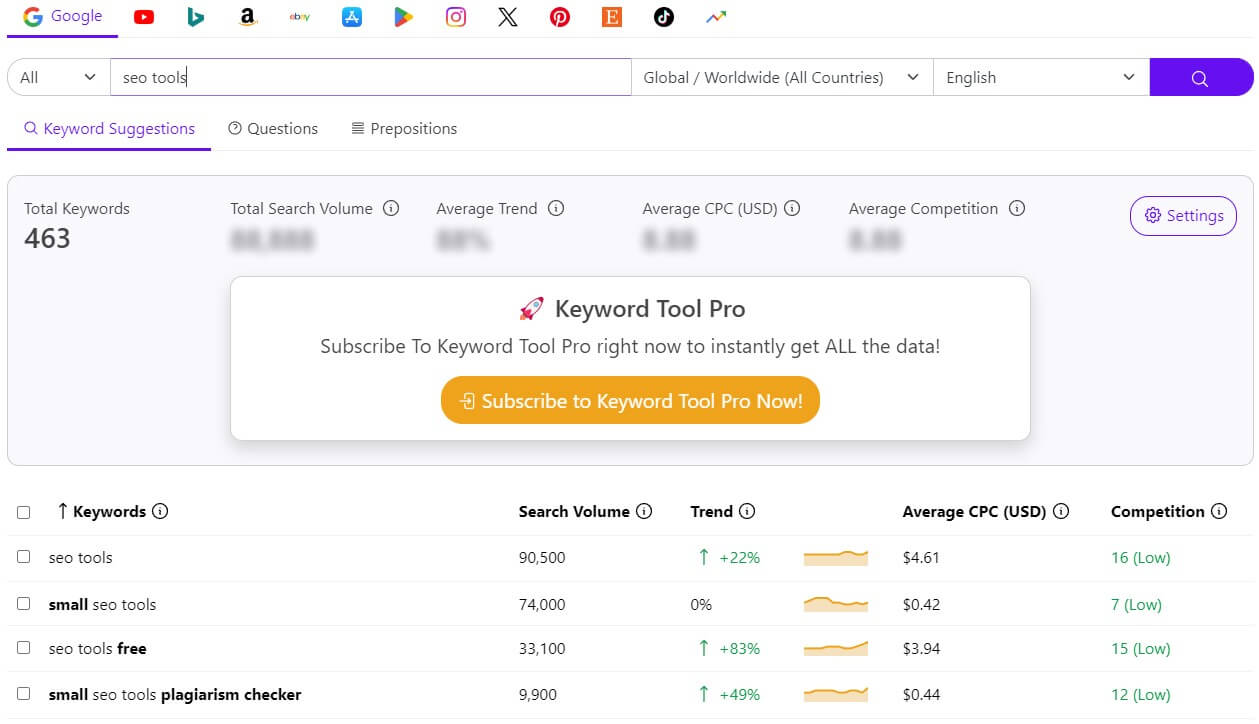 © Keywordtool.io
© Keywordtool.io
We love it for its simplicity and the ability to use the location and language filters. Moreover, KeywordTool.io supports numerous search engines like YouTube, Instagram, X, Pinterest, Amazon, Bing, TikTok, and dozens more, which is great for social media influencers.
If you have a business you’d like to promote on Facebook or Instagram, you can use KeywordTool.io to amplify your presence there.
How much does KeywordTool.io cost?
The tool has a Pro version that you can get at about $70 a month, which is too expensive, even though you’re getting more suggestions compared to the free version. We recommend this one as a free option and if you want more, better spend money on Semrush instead.
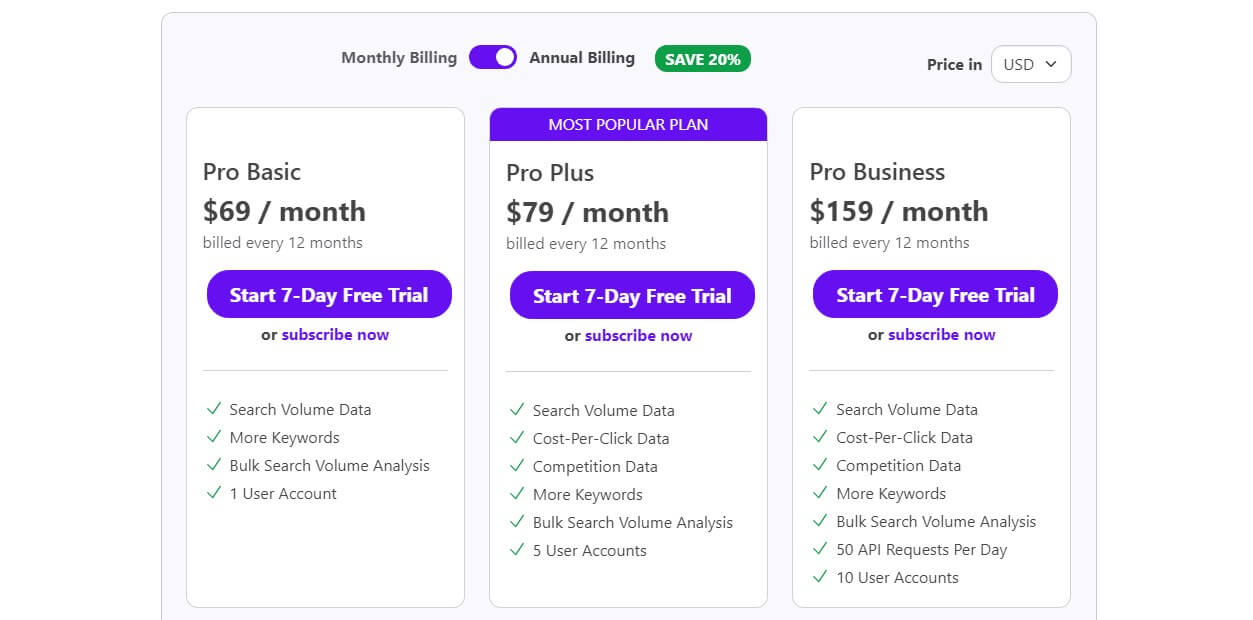 © KeywordTool.io
© KeywordTool.io
8. QuestionDB
Obtaining a higher topical authority is all about covering the subject in depth. Well, QuestionDB helps you by providing you with relevant questions based on the keyword you provided. It’s useful keyword research software to get quick and efficient results.
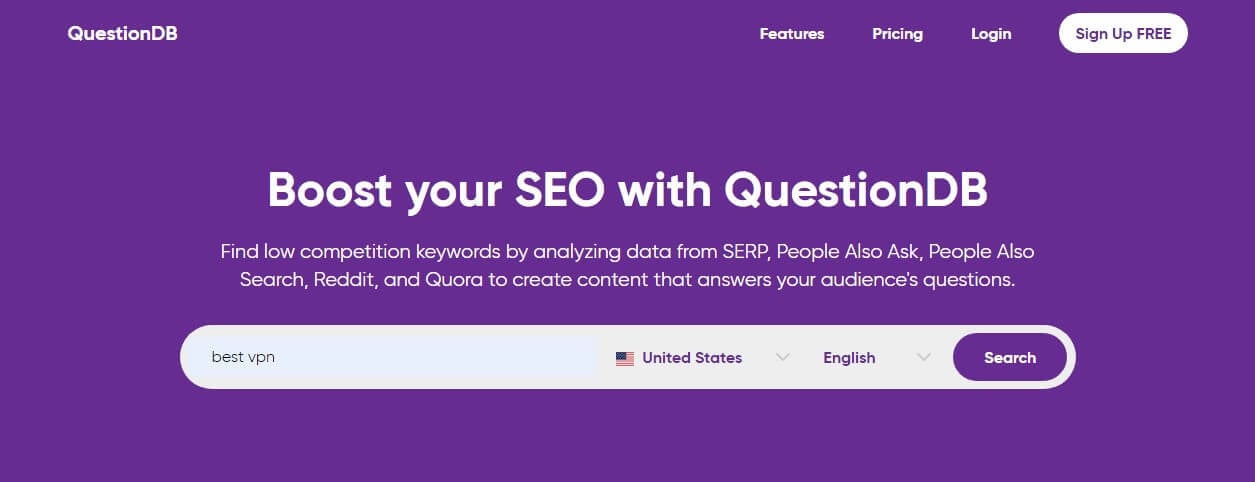 © QuestionDB
© QuestionDB
Free users can only get questions and related topics but unfortunately, without difficulty and volume metrics. On the brighter side, whenever we used QuestionDB, we found dozens of suggestions downloadable for free in the XLSX. QuestionDB is quite “narrow.”
You won’t find any rank-tracking tools here and don’t expect page crawling, domain analysis, and so on. Big boys like Semrush, SE Ranking, and Ahrefs will be more befitting.
How much does QuestionDB cost?
It’s free if you make an account. You’ll get 5 monthly searches, which is pretty low if you’re serious about improving your keyword SEO research game. The Solo plan starts at a whopping $99 a month, with 100 monthly searches and volume/difficulty metrics.
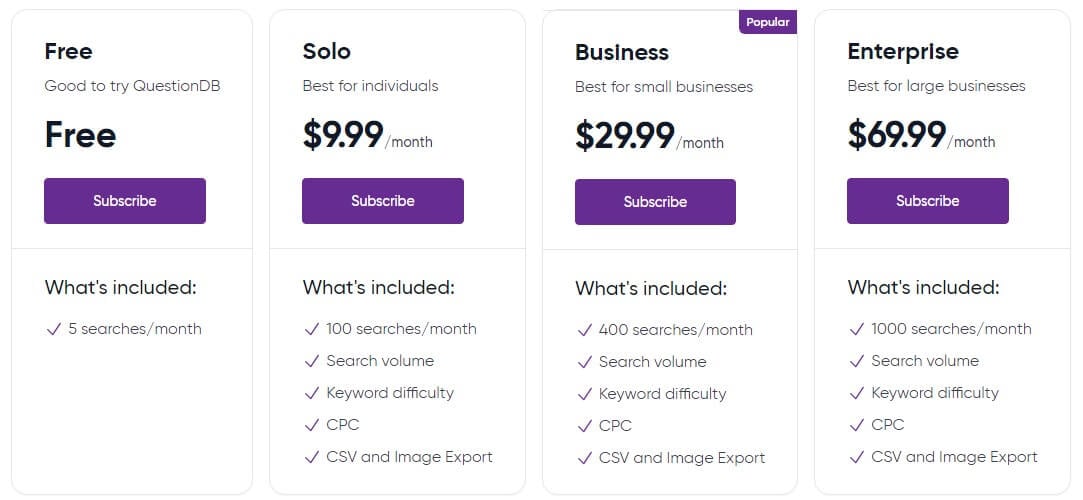 © QuestionDB
© QuestionDB
Needless to say, QuestionDB is way better as a short-term solution. At a similar monthly price, you can purchase one of our first three providers and get 10 times more.
9. KWFinder (Mangools)
Mangools comes with 5 tremendous SEO tools, one of which is KWFinder.
It’s an elementary tool for rather “shallow” keyword research compared to Semrush and SE Ranking. Still, we love its intuitive approach that lets you quickly find related phrases and questions.
Provide a seed keyword, select the location, and pick the language you want. From here, you’ll see dozens of suggestions and their SERP overview. KWFinder can pinpoint long-tail keywords too, which, as said, contribute to your SEO ranking for more specific terms.
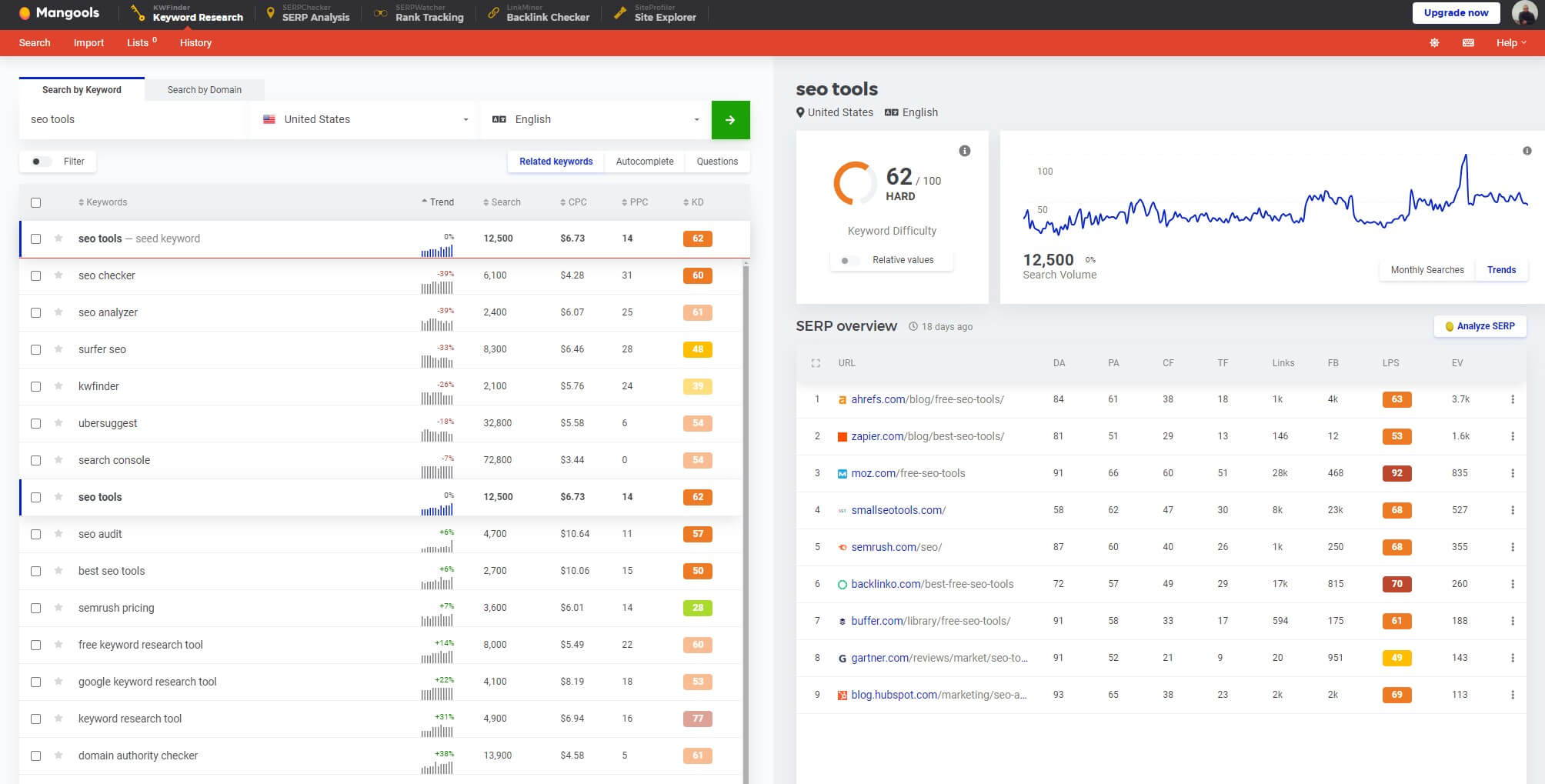 © Mangools
© Mangools
Unlike QuestionDB, KWFinder shows you volume and difficulty parameters. Its difficulty metric isn’t the most accurate but is enough to approximate your chances of ranking. If you perform keyword research by domain, you can see its ranking phrases – a useful addition!
Mangools includes the SiteProfiler tool that perfectly complements its KWFinder. Other tools are LinkMiner, SERPWatcher, and SERPChecker.
How much does KWFinder cost?
It’s free but you can use it if you make an account. In fact, all of its tools are free but you’re limited to a few daily search queries. Mangools is very affordable and its Entry plan starts at $19.90, with 25 keyword daily lookups and 50 suggestions per lookup.
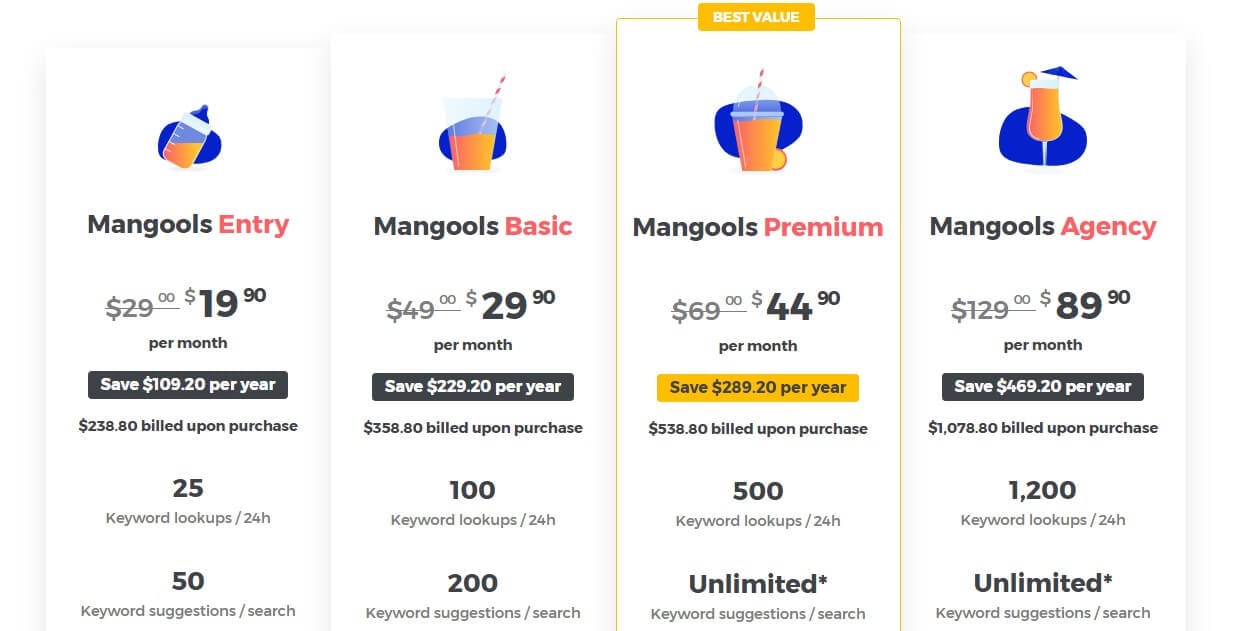 © Mangools
© Mangools
The Premium plan at under $45 a month is excellent, with 500 keyword lookups and unlimited suggestions. That would be our go-to choice if Semrush and SE Ranking perish, which, as things stand, won’t happen. At this price, SE Ranking is a better value.
10. SECockpit
SECockpit puts you in the shoes of the SEO expert whose sole task is to research keywords. It’s a Swiss company that allows you to find tons of suggestions based on the seed phrase – standard stuff. These, however, aren’t your run-of-the-mill suggestions.
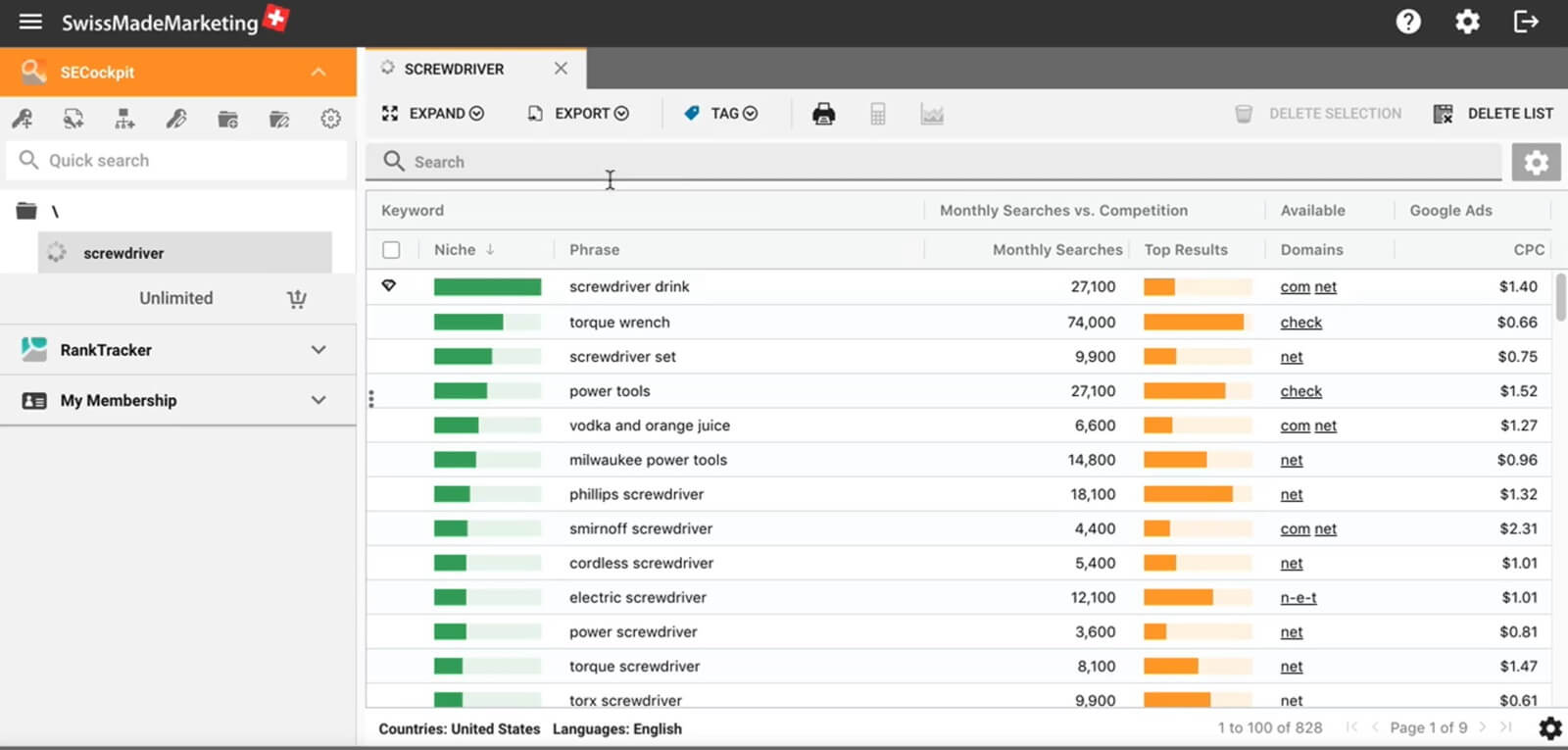 © SECockpit
© SECockpit
SECockpit displays monthly searches, CPC, keyword difficulty, traffic estimates, organic competition, search trends, and MUCH more. If you apply language and location filters, you can deepen your search and get exactly what you want in a simple-to-read report.
This software fetches most of its information from Google Keyword Planner, so its accuracy is immaculate. The keyword research tool is perfectly combined with AdWords, which delivers more keyword ideas that can also come from YouTube and Amazon Suggest.
How much does SECockpit cost?
It’s $25 a month if you pay for the annual Personal plan. Our team recommends the Pro plan if you seek the best value, as it’s $42 a month and comes with RankTracker. Just be aware that even this plan is capped at 50 daily keyword searches, which isn’t a lot.
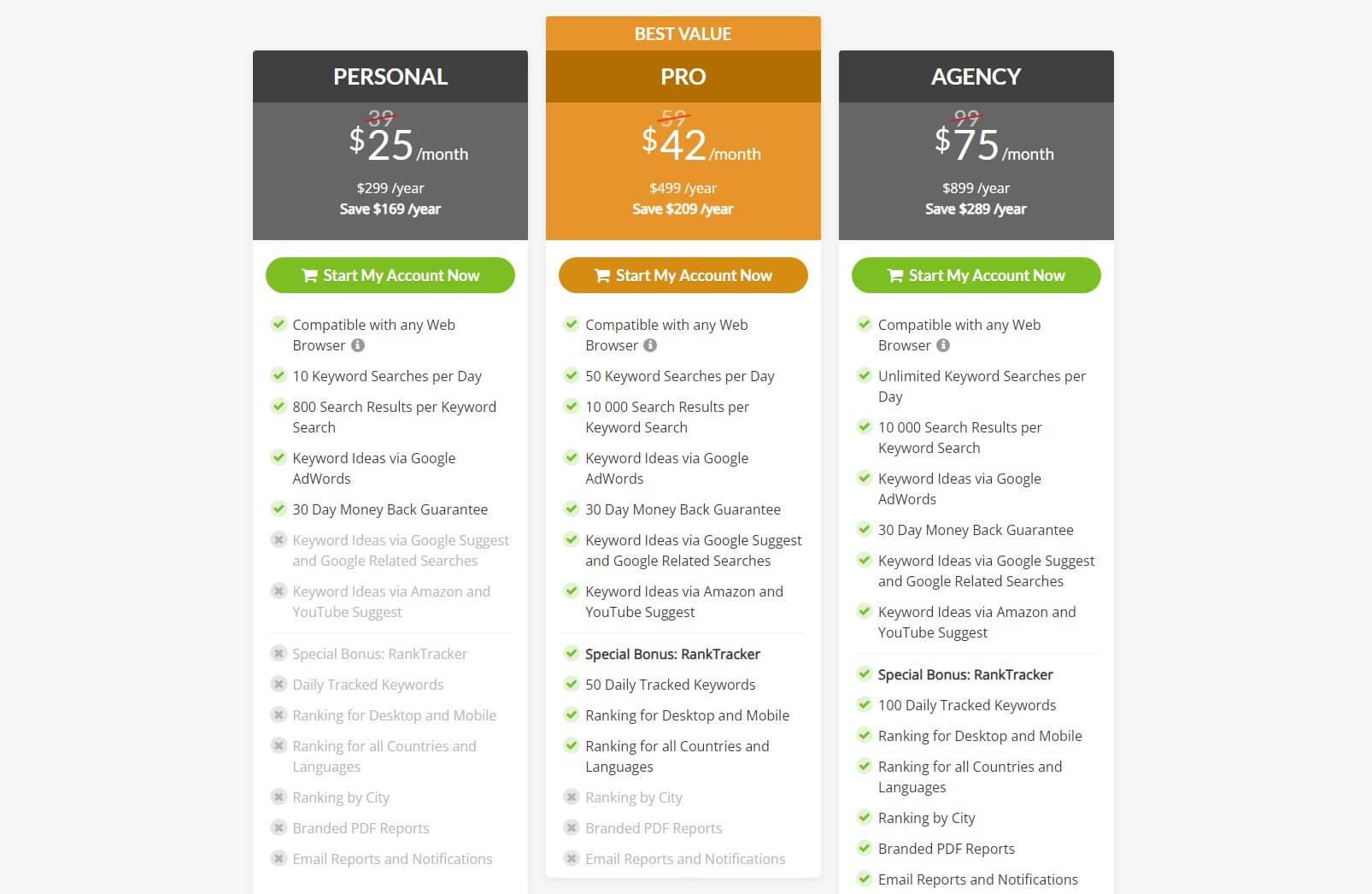 © SECockpit
© SECockpit
Conclusion
There you go – our comprehensive and detailed list of the top 10 keyword research tools for 2024 is at its end. We recommend paid options like Semrush, SE Ranking, and Ahrefs for the best results.
The good news is that even they offer free versions of their pro-grade tools.
Unfortunately, free options will limit your search queries and hinder your ability to reach your full SEO potential in the long run. While free SEO software has its place, it’s more for testing and evaluating the tool before buying it. Better keep it at that.
Now that you have 10 juicy picks, quench your thirst and go for one – grab Semrush’s 14-day free trial below and enjoy our experts’ No.1 pick risk-free.
Try Semrush’s Keyword Magic Tool Risk-Free



